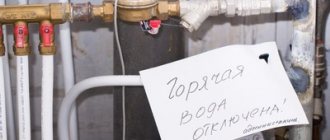In what cases can the water be turned off?
According to the law, utility workers can turn off water or heating in the entire house without warning only in two cases:
- if there is a threat of emergency situations on equipment or networks,
- in case of emergencies or natural disasters.
However, there are other situations when the management company has the right to limit the provision of utilities.
- In case of incomplete payment by the consumer for utilities. There are several nuances here. Firstly, the debt for one or more utilities must be at least 6 months old. A smaller amount of debt is not a reason to disconnect. Secondly, if the debtor has signed a debt repayment agreement and fulfills it, he also does not have the right to stop providing utilities. However, you should not violate the repayment schedule. One wrong step and you could find yourself without hot water.
- In the case of carrying out scheduled preventative repairs and maintenance work on intra-building engineering systems related to the common property of the owners of premises in an apartment building. First of all, we are talking about the traditional summer shutdown of hot water.
- If a fact of unauthorized connection of a consumer to in-house engineering systems is revealed.
- In case of receipt of a corresponding order from authorized state or municipal bodies.
- In the case of the consumer using household appliances with a power exceeding the technical characteristics of in-house engineering systems specified in the technical passport of the residential premises.
- In case the communications in your apartment are in unsatisfactory condition due to your fault. According to the law, we ourselves are responsible for the pipes and wiring in our apartments. That is, if there are any problems, it is our responsibility to call a technician and fix them, otherwise we will create a threat to the lives and property of other residents.
Keep in mind - in all these cases, the management company is obliged to warn you in writing about the planned shutdown 1 month in advance. And one more important point. You do not have the right to turn off cold water and heating for debts. Here is what government decree No. 307 says about this: “The contractor has the right to suspend the provision of utility services, with the exception of heating, cold water supply and sanitation.”
Reasons for turning off cold water supply
Most often, citizens can detect a lack of water for several reasons, these are:
- carrying out planned repairs in accordance with the approved schedule;
- unscheduled work in the event of an emergency in the intra-house system;
- repair of communications located outside the high-rise building.
If cold or hot water is turned off, citizens can call the dispatcher, and the responsible employee will report the reasons for stopping the supply of the resource and the approximate time frame for resuming the supply.
In addition, there are other situations when the water can be cut off:
- The water supply in one of the residential premises is in unsatisfactory condition. To avoid flooding of neighbors, temporary but urgent shutdown of utility systems and their repair are required;
- employees discovered an illegal connection to water communications. Unauthorized connection to the system is considered a violation of the law, and a fine is provided for this;
- Local authorities have issued an order to the utility service provider to stop water supply, and the latter is taking urgent measures to eliminate the identified violations.
Can they limit the water supply to a specific apartment?
The technology for disconnecting debtors is extremely simple - they simply weld their pipes. Some say - it’s okay, I won’t let anyone into my apartment, but the water won’t be turned off in the whole house anyway. However, knowledgeable people strongly advise against taking such a position. Especially for such cases, there is a rather expensive but effective method. A special plug is inserted into the pipe from the basement; the camera helps determine which input to plug. The invoice for the work is issued to the debtor. That is, in order to restore the supply of hot water, he will have to pay this bill, plus a fine and late fees. And, of course, the debt itself.
You are not obligated to pay for others!
However, some unscrupulous management companies, in order not to bother with point shutdowns, simply turn off the water in the entire house. Be aware - this is illegal! In paragraph 85. states: “The suspension or restriction of the provision of utility services (or the supply of utility resources) to consumers who fully comply with the obligations established by the legislation of the Russian Federation and the agreement is not permitted.”
In such cases, the action algorithm is simple:
- contact the management company with a written request to immediately turn on the hot water supply and recalculate the days of shutdown,
- If water is not supplied within three days, contact the housing inspectorate, Rospotrebnadzor and supply it.
However, now management companies are acting more cunningly - they simply distribute the debt among those residents who regularly pay their rent. This is also a reason to contact the above-mentioned authorities. You are obliged to pay only for yourself and the resources used for general house needs, but not for other owners or tenants. However, it is, unfortunately, sometimes very difficult to prove the fact of fraud in this case.
When answering the question whether water can be turned off for debt, in particular in an apartment or an entire apartment building, it should first of all be noted that utility suppliers have such a right. However, this is considered a last resort measure, which comes with many nuances and legal requirements. This is where even persistent defaulters should know their rights in order to navigate the threats of the management company and be prepared to talk with its representatives.
Quite often, management companies threaten to turn off both hot and cold water to debtors, which is not entirely correct from the legal side. It is even less correct if threats from the management company to debtors are received after just one month of delay. Here you should refer to government decree No. 354, approved back in May 2011. This document displays all the rules by which utility services are provided to consumers. It also says that hot water has the right to be turned off if the debt on housing and communal services exceeds three months, and also that turning off cold water and heating is illegal.
In accordance with these rules, due to debt, they have the right to turn off hot water, electricity, gas and intercom. Nothing more is added to this list.
Dear readers!
Our articles talk about typical ways to resolve legal issues, but each case is unique. If you want to find out how to solve your specific problem, please contact the online consultant form on the right →
It's fast and free!
Or call us by phone (24/7):
Legal requirements for the procedure
The provision of housing and communal services to citizens is regulated by the Rules approved by Decree of the Government of the Russian Federation No. 354 of 05/06/2011. According to this document, the supplier may suspend or limit the provision of services after sending a preliminary notification to the debtor.
The consumer must be familiar with the warning 30 days before the expected sanctions.
The grounds for suspension of the service are considered to be:
- Non-payment within three months.
- Incomplete payment for the same period after receiving notification from the supplier.
- Violation of the debt repayment agreement concluded between the debtor and the supplier.
The same document states that, according to sanitary standards, it is prohibited to suspend the supply:
- cold water;
- heating;
- gas intended for heating;
- sewerage.
Without them, the premises automatically become unfit for habitation, therefore, the Housing Code of the Russian Federation is violated. A direct ban on turning off cold water and heating is contained in paragraph 307 of the Decree of the Government of the Russian Federation.
Utilities have the right to turn off:
- hot water;
- electricity;
- intercom;
- gas intended for cooking.
Under what conditions is deactivation possible?
The management company turns off water based on certain principles that cannot be violated. The main conditions are the absence of:
Regardless of the circumstances, the disconnection procedure implies preliminary written notification to debtors of such intention at least twenty days in advance. When delivering a notification, it is important to take a signature from the defaulter stating that he actually received it, which is a certain difficulty, but if necessary, the management company finds a legal way out. For example, sending a registered letter with notification or even courier services.
Without official and timely notification, no one has the right to turn off anything. Turning off hot water completely, as mentioned above, is illegal, especially since employees of any institutions cannot violate the owner’s rights to the inviolability of his property and have no right to enter his home without permission. However, in practice, a separate apartment cannot be disconnected from hot water, since it is supplied through a common riser.
When is it illegal to shut off water supplies?
The consumer may face several cases of illegal water shutoff. It is important to know the shutdown standards and what to do if it is carried out in violation of the law.
- The Supplier is not entitled to carry out scheduled repairs without warning. Residents must be notified by means of an announcement on a special board near the house. The announcement will allow the population to stock up on water for cooking, cleaning, and hygiene procedures.
- You cannot cut off water for non-existent debts. The accusation must be justified, the consumer must be notified about the accumulated debt and what the deadlines for its payment are.
- The water supply cannot be stopped or its pressure in the water supply pipes reduced without significant reasons. If problems arise in the operation of the pipeline, the consumer has the right to know all the circumstances.
- There are certain regulations for carrying out repair work. After their completion, water supply must be restored as soon as possible. If there is no water for a long time after repairs, where can I complain? The responsible person is the management company; it has no right to delay the supply after the system is restored.
The described cases do not comply with the provisions of the law, therefore, if there is no cold water supply for the specified reasons, you should contact the authority responsible for the provision of services. This could be a water utility, a management company, or a homeowners' association. This statement identifies the problem and requests that it be resolved.
IMPORTANT! You need to know how much time is given for consideration of the application. The complaint must be reviewed within a month.
If actions are not taken within this time, the next step is to contact the regulatory authorities. Be sure to attach to such an application a copy of the previous application to the HOA, CC.
Temporary resource blocking
According to the law, people have the right to turn off the water supply without prior notice only temporarily if a natural disaster or force majeure occurs (pipeline or heating pipeline failure), as well as when a threat of an emergency is identified. The law does not provide for any further cases of disconnection without notification. Even if this is a planned shutdown, the management company is responsible for notifying residents at least three days in advance.
You don’t need to think long about the example, since everyone knows the planned summer shutdowns of hot water, when repair and maintenance work is carried out on the utility systems of apartment buildings.
Without notification, the management organization has the right to turn off utility services due to the fault of residents, for example, when:
Recalculation of the fee when the cold water supply is turned off
The service provider can recalculate receipts up or down. In the event of a shortfall in resources due to a water outage, consumers have the right to demand recalculation.
To do this, citizens must write an application and reflect:
- a request to reduce the amount indicated in the invoice for services provided;
- draw up your calculations with references to current standards;
- your arguments for recalculation;
- If there is documentary evidence, attach copies of available papers.
Citizens may request a reduction in payments if:
- After the completion of the technical work, the water supply was resumed in violation of the deadline. Therefore, it is possible to achieve a fee reduction of 0.15% if water is delayed for more than 4 hours at a time, or for more than 8 hours within one month;
- Water of inadequate quality flows from the tap. The fee for each day of receipt of low-quality liquid must be waived;
- the pressure in the pipes dropped by more than 25%. This is also considered unacceptable, since citizens cannot fully obtain a vital resource. It is possible to obtain a waiver of fees for specific days when the pressure in the pipes has dropped.
Citizens should know their rights and, if necessary, protect them. In this case, it is possible to achieve high-quality services, and in some cases reduce fees for under-received or low-quality services.
We also suggest that you read the previous article on a similar topic: turning off hot water by law
Extenuating circumstances
If the defaulter has a good reason for not paying water bills on time, in order to avoid disconnection, it is advisable to visit the office of the management company and find a compromise for your case. So, for example, there will be no punishment if you contact the Criminal Code for the following reasons:
Of course, no one will cancel the obligation to pay utility bills, but it is possible to get a temporary deferment or agree on partial repayment of debts without disconnecting the resource.
Illegal shutdown
In practice, sometimes there is an illegal shutdown of heating, sewerage (drainage) or hot water. In this case, residents should submit an application to the management company requesting the restoration of the disconnected service on the basis of Government Decree No. 307 of 2011 and recalculate for those days when the service was not provided. Next, after three working days, if the management company ignored the application and did not resume water supply, a claim is filed with Rospotrebnadzor or the prosecutor's office. You can also file a lawsuit, demanding that the management company be obliged to restore the supply of the disconnected resource.
Of course, one statement to higher authorities will not be enough; confirmation of the fact of the shutdown is necessary. Photographs and video recordings, witness statements (neighbours), a drawn up act (this document must be drawn up by an independent specialist and preferably in the presence of an employee of the Criminal Code) can serve as evidence.
Before filing a claim, it is important to obtain a written response from the management company, an official refusal to renew the supply of the resource. A copy of such response is attached to the statement of claim.
DHW shutdown dates in 2021
Gradually, periods without hot water supply decrease. So, back in 2011, the hot water supply system took 2 weeks to repair. Even earlier, the practice was to have no warm water supply for three weeks. And at the end of the last century, water could be turned off for the entire summer. City authorities are reducing these deadlines from year to year. Now pipe repairs in Moscow, St. Petersburg and other large cities are completed in ten days or no more than 240 hours. Usually, by Friday of the second week, hot water appears again.
How to distinguish between legal and illegal shutdowns
If there is a debt for a period of three months or more, each defaulter should be prepared to have the water supply turned off. However, you should not forget about your rights. So it is necessary to understand when actions are legal, and when they are not, and what to do in this case.
| Legal shutdown | Illegal shutdown |
| If there are no payments for three months or more, the disconnection must be notified in writing 20-30 days in advance. To reconnect the utility service, you must pay off the debt. After repaying the debt, the connection should occur within two days. Payment for connection work lies with the debtor. When repaying the debt in installments, a corresponding agreement is concluded in writing. If you sign this in advance, appearing in person at the city water supply office, the water will not be turned off. | The management organization does not have the right to turn off water or heat in an apartment building without a corresponding court order. If a shutdown occurs, you must request in writing from the management company to restore the water supply. If it is not connected within three days, then a complaint is filed with the prosecutor’s office and the court. |
Maximum water outage duration
Settlements have different population sizes. The time of turning off the water supply depends on this indicator. In settlements with a population of 5 to 50 thousand or more, water can be turned off for no more than 10 minutes. The same time is given to switch the system to the emergency line. If the village has a population of 5 thousand or less, the water can be turned off for no more than a day.
ATTENTION! Repair work is carried out within 24 hours, no more.
It is important that the responsible dispatcher is at the workplace, can inform consumers, and monitor the progress of repairs. If possible, emergency water supply is provided and it is delivered to residential buildings.
What should the owner do?
If water is turned off for no reason or due to debt, but without following this procedure, you must immediately file a complaint with higher authorities. However, first of all, you should officially contact the management company with a request to resume the supply of the resource on the basis of an unlawful shutdown. In addition, the consumer has the right to demand a recalculation for the time when his water was turned off due to the fault of the management company.
If resource stations are also blocked within three days, you can contact higher management structures. For example, to Rospotrebnadzor, the Housing Inspectorate, and the prosecutor's office. The most extreme measure is to file a claim in court. However, for this it is necessary to prepare copies of written statements, complaints, claims to other institutions, copies of their official responses and other documentary evidence of violation of their rights and measures taken.
What is also important for consumers to know is that the rules for turning off water state that this procedure is only possible if the debtor has not paid anything at all for the resource for three months. This means, if at least some amount was received into the current account, even a couple of tens of rubles,
Preventive measures for individual officials
When filing a complaint against the management company with the Housing Inspectorate, it is within the competence of the latter, referring to the Civil Code of the Russian Federation, to fine an official who holds a responsible position in the Criminal Code on average one thousand rubles, or to fine a legal entity ten thousand.
When turning to the judicial authorities, the management company is already involved under the articles of the Criminal Code of the Russian Federation. According to him, a preventive measure can be in the form of:
- Fine to an official up to ten thousand rubles;
- Fine for a legal entity - up to two hundred thousand;
- Imprisonment for a period of two to five years, if the actions of the official led to aggravating circumstances.
Since the management company is unlikely to want to receive, whatever the fine, from higher structures, as a rule, all issues with consumers are resolved pre-trial. However, it is necessary to act immediately, persistently and competently. Experienced lawyers specializing in this legal field will help you get rid of the problem as quickly as possible and as effectively as possible. Even if the consumer does not want or is unable to pay for full legal support of the process, even one consultation will be useful to coordinate further actions.
Emergency shutdown of cold water
If a breakdown is detected in the water supply system, the resource supplying organization is obliged to take immediate measures to identify the causes. Utilities are also obliged to eliminate violations and carry out repairs as soon as possible. All efforts of the organization must be aimed at eliminating the accident. The time to solve the problem and carry out repairs is regulated by SNiP 2.04.02-84.
Reasons for an emergency shutdown of water supply, in addition to a pipeline break and other damage to the system:
| Reduced quality of drinking water | In such a situation, water supply will be resumed only after the problem has been completely eliminated. Since these indicators affect people’s health, therefore, this measure is completely justified. |
| To extinguish fires | During firefighting periods, increased volumes of water are required to eliminate the problem as quickly as possible. Water must be provided immediately after the fire has been extinguished. |
During the period of restriction of water supply through the central system, the utility organization is obliged to provide a supply of drinking water in special automobile tanks. The volume of water should be delivered taking into account consumption standards per person. But there is one drawback - the time for water delivery is not specified.
At the same time, during planned outages, utility companies warn consumers in advance about the outage. Citizens have time to prepare for the shutdown; they stock up on their own. In this case, drinking water tanks will deliver liquid only if the planned work lasts more than a day. In emergency situations, the organization is obliged to ensure the supply of water to meet the daily needs of citizens.










